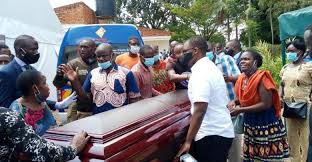Late Bob Kasango’s relatives insist rites owed by the Living to the dead in Adhola Custom must be adhered to
By Emmanuel Onyango
If anyone pondered why there was drama in church over the final resting place of the deceased Bob Kasango, it is grounded in the Rites Owed by the Living to the Dead in Adhola Custom. Much as the scenes were regrettable, it can only be understood from the context of Adhola customs. The Adhola fear “chen” (retributions) from the dead arising from improper burial!
The Adhola believe that life is sacred and that every person has a right to proper treatment and care in life and death. If a person dies, they are buried in a grave within the homestead. The deceased has a right to land from the parents upon which his house, body and those of his descendants will be built and laid.
Anywhere else is a “throw away” believed to have serious ramifications. Jopadhola (Adhola in short) ensure that the dead are given a proper burial and their families are provided with moral, material, and spiritual support.
Death among the Adhola is an occasion for every member of the community to come together to mourn, remember, commiserate, and send off the spirit of the dead into the next world. Families, relatives, friends, inlaws and members of the community particularly childhood friends mourn at the homestead of the deceased venting their tears in whatever way appropriate.
Crying, shouting, war & funeral songs, rolling, scratching oneself, hair, etc is allowed.
Families take such steps caring for the dead not only out of love, but also out of a strong belief in life after death; more specifically, the belief of power of the dead over the living believing that when somebody dies, their spirit passes on to another world where they could continue communing with the living, dispensing favors, misfortune and even physical torture.

The Adhola also have strong trepidation for the dead. Rooted in a long-standing practice of ancestor reverence, the Adhola believe the living have profound responsibilities with regard to the dead. The trauma of losing a loved one is ritualistically addressed through rites of mourning and burial.
While the Adhola traditional practices have been necessarily abbreviated due to modernity and a lack of resources, the two essential requirements remain i.e before and during burial, and after burial. They believe that when even the most basic of rites are not performed, the spiritual and psychological consequences can be profound.
As stated these rites are in two distinct stages.
The first stage begins at the moment of death. After death is confirmed, emotions flare and mourning begins. A bonfire is lit in living memory of a fallen loved one. The family sends word to distant relatives, inlaws and friends. Attending the funeral is a family obligation among the Adhola, and failing to attend is a sign of disrespect for the dead with serious psychological and other punitive consequences, from the living relatives.
The burial customs prescribe that the body of the dead be buried at the family home. The body is buried so that the head rests east, in the direction of the sunrise or west in the direction of the sunset, depending on the clan custom.
The act of burying the dead is considered too painful for the family; accordingly, an okewo (a male maternal relation) or outsider (modern day funeral service) typically performs the service. A religious leader will be handy to conduct order of service.
The second stage begins after burial with “pido” (family meeting) that is minuted, held on the day following the third night after death (for men) and the fourth day (for women). In the event there is delayed burial, this would be on the next day after burial. Ideally, goats are slaughtered, as well as a bull. It is customary for close relatives, friends and inlaws to stay on after burial until after pido.
During the pido, stock is taken of the life, all property, spouses and children and the heir to the deceased is selected and enthroned. If a man, his property is apportioned in accordance with customs of inheritance (today this has been synced with the law, though there is a marked difference in recognising wives and children). There are no illegitimate biological children of the deceased and all biological children are recognised.
Then a senior member of the clan would deliver a funeral oration that both praises the dead and called on the successor to be worthy of his memory. A day is set for neko mach (putting out bon fire) and lumbe (last funeral rites) signifying closing of the mourning period.
Modern burials combine neko mach and pido into one ceremony to shorten the mourning period and also edit out unnecessary (or unholy) rituals for the sake of modernity but also sometimes financial reasons and time constraints.
In contrast to the neko mach, the lumbe is a joyous celebration – the closing of the period of mourning – and is characterized by singing and dancing that lasts up to two nights or more, usually across the weekend, from Friday through Sunday.
These ceremonies commemorating the end of mourning is really cheeky characterized by drinking, slaughtering and eating chickens, goats and cows at the homestead of the deceased and dancing away the sorrows.
After the last funeral rites, members of the family are allowed to name their children after the dead believing that this is one of the best ways to keep their memory alive.
Depending on the legacy and status, the Adhola observe mourning, bereavement, and remembrance ceremonies that sometimes last for weeks, months, even years.
If rites are not properly handled, it is commonly reported that families of the bereaved get nightmares and seizures over “complaints” from the dead. Much as this could be psychological, proper funeral rites atones for what has happened and gives the bereaved family strength to move on. Funeral rites (practices) give the dead honor.
The veracity of life after death may be contentious, but respect for the dead and the need for a decent and peaceful send off cannot be in dispute. Adhola Customs are accepted as legal requirements or obligatory rules of conduct, practices and beliefs that are so vital and intrinsic a part of their social and economic system that they are treated as if they are laws in Padhola.
This is strengthened by the fact that the Adhola customary legal regime is dynamic and is constantly evolving and incorporate policy government directions legal concepts and measures drawn from our legislative legal systems.
Uganda Vision 2040 (Chapter 5) emphasizes the development of a National Value system to change citizen’s mindsets, promotion of patriotism, and enhancement of national identity and nurturing of an appropriate ideological orientation.

The National Development Plan (NDPII) 2015/2016 -2019/2020 recognizes that culture is manifested in various forms and influences different aspects of perception and aspirations in life and development options. The Plan emphasizes the promotion of positive cultural values, norms and practices.
The Institution of Traditional or Cultural Leaders Act (2011) enforces institutional frameworks for customary laws under Ministry of Gender Labour and Social Development.
International Conventions, Declarations and Protocols include the Sustainable Development Goals that provide for respect and protection for traditional and local livelihoods, recognition of culture as a component of sustainable development and full participation of Indigenous peoples in decision making in sustainable development programs and policies at all stages and at all levels.

The United National Declaration on the Rights of Indigenous Peoples (UNDRIP) provides for three principles: the right to self determination, right to lands, territories and resources and cultural rights of indigenous peoples.
Adhola Culture concerns itself with socially transmitted behavior patterns, habits, knowledge, beliefs, arts, morals, laws, customs, institutions and all other products of human work and thought of the Adhola. It is a strong pillar of Adhola society, transmitted from one generation to another.
Adhola cultural norms (Customs) could be important guides for resolution of disputes arising from unlegislated values and practices or where the written laws are silent like funeral arrangements. Funeral practices among the Adhola is settled and is “the law” among the Jopadhola.
